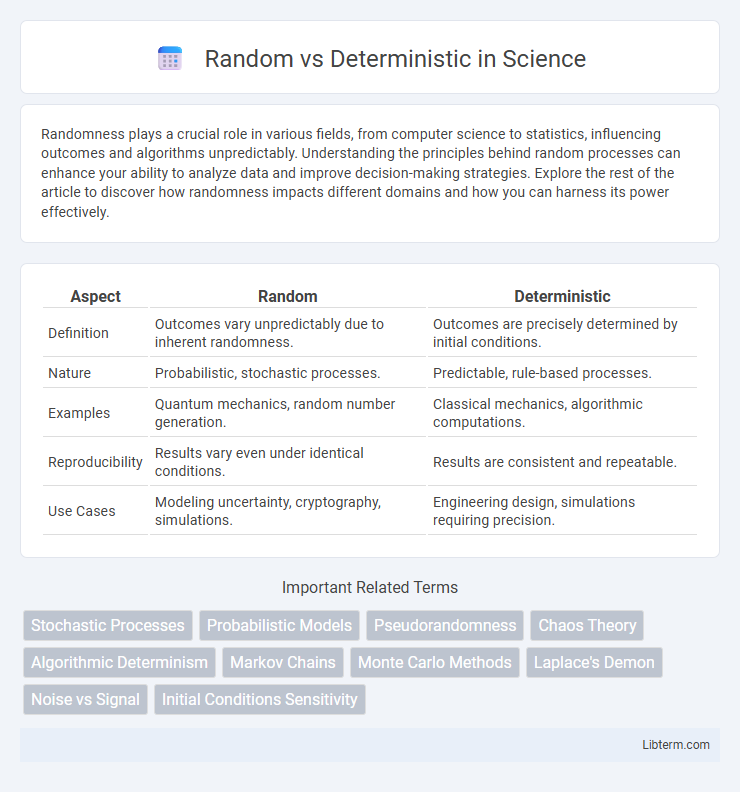Randomness plays a crucial role in various fields, from computer science to statistics, influencing outcomes and algorithms unpredictably. Understanding the principles behind random processes can enhance your ability to analyze data and improve decision-making strategies. Explore the rest of the article to discover how randomness impacts different domains and how you can harness its power effectively.
Table of Comparison
| Aspect | Random | Deterministic |
|---|---|---|
| Definition | Outcomes vary unpredictably due to inherent randomness. | Outcomes are precisely determined by initial conditions. |
| Nature | Probabilistic, stochastic processes. | Predictable, rule-based processes. |
| Examples | Quantum mechanics, random number generation. | Classical mechanics, algorithmic computations. |
| Reproducibility | Results vary even under identical conditions. | Results are consistent and repeatable. |
| Use Cases | Modeling uncertainty, cryptography, simulations. | Engineering design, simulations requiring precision. |
Introduction to Random and Deterministic Systems
Random systems exhibit unpredictable behavior influenced by probabilistic events, making outcomes uncertain despite initial conditions. Deterministic systems follow precise rules where identical inputs always produce the same outputs, enabling predictability and replicability. Understanding the distinction between these systems is crucial in fields such as physics, computer science, and engineering for modeling and simulation purposes.
Defining Randomness: Key Characteristics
Randomness is characterized by unpredictability, lack of pattern, and inherent uncertainty within outcomes, distinguishing it from deterministic processes that follow predefined rules. Key characteristics include statistical independence, where each event is unaffected by prior occurrences, and equal probability distribution across possible outcomes. These traits enable true randomness to be utilized in cryptography, simulations, and probabilistic modeling for accurate representation of real-world variability.
Understanding Determinism: Core Concepts
Determinism refers to the principle that all events, including human actions, are ultimately determined by preceding causes in a predictable manner. Core concepts involve causal chains, where each state or event is a direct result of prior states governed by natural laws. Understanding determinism requires analyzing how initial conditions and governing rules lead to specific outcomes without randomness or variation.
Differences Between Random and Deterministic Processes
Random processes generate outcomes influenced by inherent unpredictability and probabilistic behavior, often modeled using stochastic methods and probability distributions. Deterministic processes, governed by fixed rules and initial conditions, produce predictable and repeatable results without randomness. Key differences lie in uncertainty presence, outcome predictability, and reliance on probability versus certainty in their underlying mechanisms.
Real-World Examples of Random Systems
Random systems manifest in real-world phenomena such as weather patterns, stock market fluctuations, and radioactive decay, where outcomes cannot be precisely predicted due to inherent uncertainty and probabilistic nature. Conversely, deterministic systems like classical mechanics or computer algorithms follow predictable, predefined rules resulting in reproducible outcomes. Understanding the distinction aids in modeling complex environments and developing strategies for risk management and decision-making.
Common Applications of Deterministic Models
Deterministic models are extensively used in engineering for system design and control, ensuring predictable outcomes in processes such as robotics and manufacturing. In finance, these models aid in precise risk assessment and portfolio optimization by eliminating randomness from projections. Additionally, deterministic simulations drive climate modeling and supply chain management, enhancing decision-making through consistent and repeatable results.
Random vs Deterministic in Computer Science
Random algorithms in computer science utilize probabilistic processes to produce varied outputs even with the same input, often improving efficiency in scenarios like randomized search or Monte Carlo simulations. Deterministic algorithms follow a predefined sequence of operations, ensuring consistent and predictable results for identical inputs, which is crucial for applications requiring reproducibility and reliability. The choice between random and deterministic approaches depends on trade-offs such as performance, accuracy, and problem complexity in computational tasks.
Implications for Predictability and Uncertainty
Random processes generate outcomes that are inherently unpredictable due to their probabilistic nature, leading to high uncertainty in forecasting. Deterministic systems follow fixed rules or equations, enabling precise predictions if initial conditions are known, thereby reducing uncertainty. Understanding the distinction is crucial for applications in fields like weather modeling, finance, and engineering, where predictability directly impacts decision-making and risk management.
Advantages and Limitations of Each Approach
Random algorithms offer advantages such as simplicity and efficiency in solving complex problems with unpredictable inputs, often providing good average-case performance and robustness against certain worst-case scenarios. Deterministic algorithms ensure reproducibility and predictable outcomes, which are critical for applications requiring exact results and debugging ease. However, random methods may lack consistency and reliability in results, while deterministic approaches can be computationally expensive or infeasible for large-scale problems.
Choosing Between Random and Deterministic Methods
Choosing between random and deterministic methods depends on the problem's complexity and desired outcome predictability. Random methods, such as Monte Carlo simulations, offer flexibility and robustness in solving problems with uncertainty or high dimensionality. Deterministic methods provide precise, repeatable results ideal for scenarios requiring accuracy and predictable behavior.
Random Infographic

 libterm.com
libterm.com